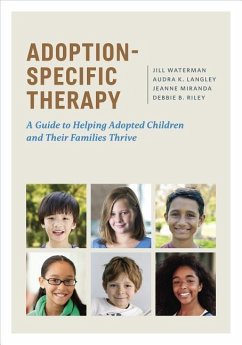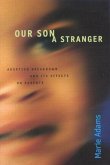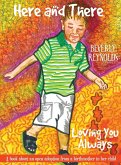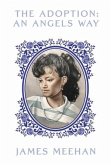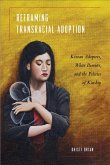Jill Waterman, Audra K. Langley, Jeanne Miranda
Adoption-Specific Therapy: A Guide to Helping Adopted Children and Their Families Thrive
Jill Waterman, Audra K. Langley, Jeanne Miranda
Adoption-Specific Therapy: A Guide to Helping Adopted Children and Their Families Thrive
- Gebundenes Buch
- Merkliste
- Auf die Merkliste
- Bewerten Bewerten
- Teilen
- Produkt teilen
- Produkterinnerung
- Produkterinnerung
Children who are adopted at an older age through foster care and those adopted from overseas orphanages are at high risk for behavioural and emotional distress. This important manual presents a structured, evidence-based protocol for providing mental health treatment to families adopting vulnerable children.
Andere Kunden interessierten sich auch für
![Always and Forever: A Keepsake Book for Adoptive Families Always and Forever: A Keepsake Book for Adoptive Families]() Amelia RiedlerAlways and Forever: A Keepsake Book for Adoptive Families21,99 €
Amelia RiedlerAlways and Forever: A Keepsake Book for Adoptive Families21,99 €![A Garden of Love Where Families Bloom: The Adoption Connection A Garden of Love Where Families Bloom: The Adoption Connection]() Christy R. KutzA Garden of Love Where Families Bloom: The Adoption Connection21,99 €
Christy R. KutzA Garden of Love Where Families Bloom: The Adoption Connection21,99 €![Our Son, a Stranger: Adoption Breakdown and Its Effects on Parents Our Son, a Stranger: Adoption Breakdown and Its Effects on Parents]() Marie AdamsOur Son, a Stranger: Adoption Breakdown and Its Effects on Parents37,99 €
Marie AdamsOur Son, a Stranger: Adoption Breakdown and Its Effects on Parents37,99 €![Here and There, Loving You Always: A Book About An Open Adoption From a Birthmother to Her Child Here and There, Loving You Always: A Book About An Open Adoption From a Birthmother to Her Child]() Beverly ReynoldsHere and There, Loving You Always: A Book About An Open Adoption From a Birthmother to Her Child26,99 €
Beverly ReynoldsHere and There, Loving You Always: A Book About An Open Adoption From a Birthmother to Her Child26,99 €![Tangled Vines of Good Intentions Tangled Vines of Good Intentions]() Kay LeeTangled Vines of Good Intentions26,99 €
Kay LeeTangled Vines of Good Intentions26,99 €![The Adoption: An Angels Way The Adoption: An Angels Way]() James MeehanThe Adoption: An Angels Way29,99 €
James MeehanThe Adoption: An Angels Way29,99 €![Reframing Transracial Adoption: Adopted Koreans, White Parents, and the Politics of Kinship Reframing Transracial Adoption: Adopted Koreans, White Parents, and the Politics of Kinship]() Kristi BrianReframing Transracial Adoption: Adopted Koreans, White Parents, and the Politics of Kinship88,99 €
Kristi BrianReframing Transracial Adoption: Adopted Koreans, White Parents, and the Politics of Kinship88,99 €-
-
-
Children who are adopted at an older age through foster care and those adopted from overseas orphanages are at high risk for behavioural and emotional distress. This important manual presents a structured, evidence-based protocol for providing mental health treatment to families adopting vulnerable children.
Produktdetails
- Produktdetails
- Verlag: American Psychological Association (APA)
- Seitenzahl: 269
- Erscheinungstermin: 10. Juli 2018
- Englisch
- Abmessung: 259mm x 183mm x 18mm
- Gewicht: 680g
- ISBN-13: 9781433829246
- ISBN-10: 143382924X
- Artikelnr.: 52614736
- Verlag: American Psychological Association (APA)
- Seitenzahl: 269
- Erscheinungstermin: 10. Juli 2018
- Englisch
- Abmessung: 259mm x 183mm x 18mm
- Gewicht: 680g
- ISBN-13: 9781433829246
- ISBN-10: 143382924X
- Artikelnr.: 52614736
Jill Waterman, PhD, is adjunct professor emerita in the University of California Los Angeles (UCLA) psychology department and for many years was coordinator of the UCLA Psychology Clinic, the training clinic for UCLA’s top-ranked clinical psychology doctoral program. She was one of the initial developers of UCLA Training, Intervention, Education, and Services (TIES) for Adoption (now called UCLA TIES for Families), an interdisciplinary program to support successful adoption from foster care of children with prenatal substance exposure and other at-risk conditions, and she has been with TIES since its inception in 1995. Much of the content of the adoption-specific therapy (ADAPT) model was developed through her years of clinical work and supervision at TIES. Currently, Dr. Waterman is the director of Infant Mental Health at UCLA TIES for Families, where she oversees the clinical and research components of the program. Dr. Waterman’s research involves various aspects of adoption and child trauma. She and her students have followed one cohort of children adopted from foster care for 15–20 years and are now following a cohort of infants with prenatal substance exposure who are in foster care with prospective adoptive parents. In addition, she has provided training and consultation both locally and nationally on issues related to parenting and treatment of children in or adopted from foster care. Dr. Waterman has cochaired 21 doctoral dissertations and is the author of two books on child sexual abuse as well as an evidence-based group treatment manual for at-risk middle school students. Audra K. Langley, PhD, is a clinical child psychologist and associate professor at the UCLA Semel Institute for Neuroscience and Human Behavior and the UCLA David Geffen School of Medicine Department of Pediatrics. She is the director of UCLA TIES for Families, an innovative multidisciplinary program for children in or adopted from foster care and their families in Los Angeles County. Dr. Langley specializes in evidence-based treatments for children and adolescents with posttraumatic stress, anxiety, and related issues. Her body of work has sought to increase access to quality mental health interventions for underserved populations of children, including those in schools and involved with the child welfare system. Dr. Langley has been the director of training for the Substance Abuse and Mental Health Services Administration–funded Trauma Services Center for Resiliency, Hope, and Wellness in Schools since 2003 and served for 7 years as chair of the Schools Committee for the National Child Traumatic Stress Network. Nationally and locally, she provides training and consultation related to trauma-informed, child-welfare competent care to professionals in multiple fields and to parents and caregivers. Dr. Langley recently developed and evaluated Bounce Back, an intervention for ethnically and socioeconomically diverse elementary-aged children exposed to traumatic events, which has since been disseminated nationally. She is the author of four treatment manuals and a proud parent of biological and adopted children. Jeanne Miranda, PhD, is a professor in the department of psychiatry and biobehavioral sciences at UCLA. Her major research contributions have been in evaluating mental health care for poor and minority women. She is evaluating an intervention her team developed for families adopting older children from foster care, adapting depression interventions for young women in Uganda, as well as evaluating governmental social programs there. She has developed and is evaluating a resilience intervention for low-income and minority lesbian, gay, bisexual, and transgender populations. She was the senior scientific editor of Mental Health: Culture, Race and Ethnicity: A Report of the Surgeon General. She became a member of the Institute of Medicine, now the National Academy of Medicine, in 2005. Dr. Miranda is the 2008 recipient of the Emily Mumford Award for Contributions to Social Medicine from Columbia University. Debbie B. Riley, LCMFT, is a licensed clinical marriage and family therapist and CEO and cofounder of the Center for Adoption Support and Education (C.A.S.E.), an independent, nonprofit adoptive family support center in the Baltimore–Washington area. A nationally recognized adoption expert and dynamic public speaker, Ms. Riley has 35 years of professional experience, including extensive health care management, administrative expertise, designing and developing nationally acclaimed adoption competent programs, and direct delivery of specialized counseling services, which affords her the broad knowledge and nationally respected expertise needed to promote mental health training, child advocacy, and public policy development. Ms. Riley created a continuum of innovative, culturally responsive, evidenced-informed programs to improve the behavioral outcomes of foster and adopted youth and their families, which has become a nationally recognized model. Ms. Riley consults with national child welfare agencies on complex child welfare issues and systems of care enhancement. For over a decade, she has built and implemented a framework for training an adoption-competent mental health workforce nationally and is the founder of the Training for Adoption Competency curriculum currently taught in 17 states. Through a recent federal 5-year grant awarded to C.A.S.E. from the U.S. Department of Health and Human Services, Administration for Children and Families, Ms. Riley serves as the principal investigator to establish a National Adoption Competency Mental Health Training Initiative (NTI). The initiative will build the adoption competency capacity of child welfare professionals and mental health practitioners who serve youth moving toward permanency as well as youth living in permanent adoptive or guardianship homes. The NTI will develop state-of-the-art, evidence-informed adoption competency web-based curricula for each group, with quality improvement components for use on a national basis. Ms. Riley is coauthor of Beneath the Mask: Understanding Adopted Teens, contributing author of the article “Adoption Competent Clinical Practice: Defining Its Meaning and Development” (Adoption Quarterly, 16, 2013), and contributing author of Transracial and Intercountry Adoptions: Cultural Guidance for Professionals (edited by Rowena Fong and Ruth McRoy, 2016).
List of Online Handouts
Preface
Acknowledgments
Introduction
Part I: Foundations
Chapter 1: Theoretical and Empirical Underpinnings of Adoption-Specific
Therapy
Chapter 2: Overview of Adoption-Specific Therapy
Part II: The ADAPT Curriculum
Chapter 3: Module 1: Trust, Positive Coping Strategies, and Behavior
Management
Chapter 4: Module 2: Developmental Understanding of Adoption Experience
Chapter 5: Module 3: Loss and Grief Issues in Adoption
Chapter 6: Module 4: Attachment and Joining With the Adoptive Family
Chapter 7: Module 5: Search for Identity and Transracial Adoption
Chapter 8: Module 6: Adoption and the Outside World
Chapter 9: Module 7: Trauma Treatment
Chapter 10: The Termination Session
References
Index
About the Authors
Preface
Acknowledgments
Introduction
Part I: Foundations
Chapter 1: Theoretical and Empirical Underpinnings of Adoption-Specific
Therapy
Chapter 2: Overview of Adoption-Specific Therapy
Part II: The ADAPT Curriculum
Chapter 3: Module 1: Trust, Positive Coping Strategies, and Behavior
Management
Chapter 4: Module 2: Developmental Understanding of Adoption Experience
Chapter 5: Module 3: Loss and Grief Issues in Adoption
Chapter 6: Module 4: Attachment and Joining With the Adoptive Family
Chapter 7: Module 5: Search for Identity and Transracial Adoption
Chapter 8: Module 6: Adoption and the Outside World
Chapter 9: Module 7: Trauma Treatment
Chapter 10: The Termination Session
References
Index
About the Authors
List of Online Handouts
Preface
Acknowledgments
Introduction
Part I: Foundations
Chapter 1: Theoretical and Empirical Underpinnings of Adoption-Specific
Therapy
Chapter 2: Overview of Adoption-Specific Therapy
Part II: The ADAPT Curriculum
Chapter 3: Module 1: Trust, Positive Coping Strategies, and Behavior
Management
Chapter 4: Module 2: Developmental Understanding of Adoption Experience
Chapter 5: Module 3: Loss and Grief Issues in Adoption
Chapter 6: Module 4: Attachment and Joining With the Adoptive Family
Chapter 7: Module 5: Search for Identity and Transracial Adoption
Chapter 8: Module 6: Adoption and the Outside World
Chapter 9: Module 7: Trauma Treatment
Chapter 10: The Termination Session
References
Index
About the Authors
Preface
Acknowledgments
Introduction
Part I: Foundations
Chapter 1: Theoretical and Empirical Underpinnings of Adoption-Specific
Therapy
Chapter 2: Overview of Adoption-Specific Therapy
Part II: The ADAPT Curriculum
Chapter 3: Module 1: Trust, Positive Coping Strategies, and Behavior
Management
Chapter 4: Module 2: Developmental Understanding of Adoption Experience
Chapter 5: Module 3: Loss and Grief Issues in Adoption
Chapter 6: Module 4: Attachment and Joining With the Adoptive Family
Chapter 7: Module 5: Search for Identity and Transracial Adoption
Chapter 8: Module 6: Adoption and the Outside World
Chapter 9: Module 7: Trauma Treatment
Chapter 10: The Termination Session
References
Index
About the Authors

